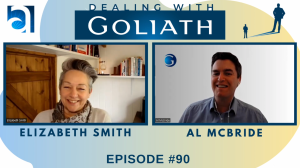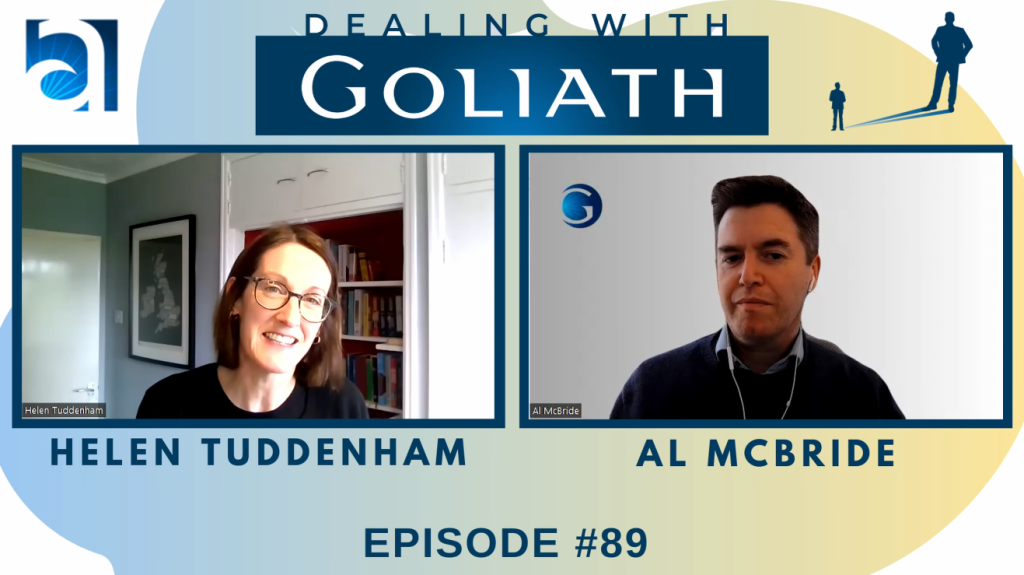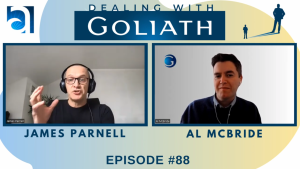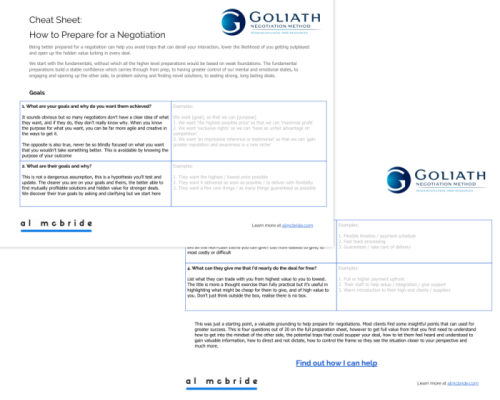

From Stuck to Soaring: Living Your Own Definition of Success Not Anyone Else’s with Helen Tuddenham #089
Show Notes:
Are you living up to your definition of success or someone else’s? What does success mean to you? As business leaders, it can be too easy to chase a definition of success that has been foisted on us by others or may once have resonated but now no longer fits with the leader we aspire to become.
Without an authentic and personal definition of success, we can fall into a cycle of wavering between projects, being solely influenced by external trends or comparisons with our competitors and peers. This episode will guide you in uncovering your own interpretation of success and how to pursue it with purpose and without distraction.
GUEST BIO:
Helen Tuddenham is an executive coach and leadership development consultant, who works with experienced professionals to help them untangle the complexities of leadership.
She supports them to figure out what’s holding them back and eliminate those sticking points. As a result, they gain fresh perspectives on who they are and how they lead, and an ability to take on new challenges and thrive in their career.
Prior to setting up her own business, Helen was a Director of the People and Culture Risk team at PwC UK, advising finance, internal audit, and compliance teams on improving capability and culture. She is also a non-Exec Director and chartered accountant.
Topics explored:
- When individuals feel stuck in their current role or organization, unsure of the next step to take.
- Common Trap: listening to an inner negative voice or
- Outer voices that can limit your perspective
- Inner critic versus inner mentor,
- How to better manage self-doubt.
- The disconnect between external expectations and internal cultures in career advancement.
- How to use the inner mentor or future self to navigate the inner critic
- The importance of identifying strengths and passions.
- Helen looks for language and body language cues in coaching clients who are not living up to their own definition of success.
- Listening to notice excitement levels when discussing career moves or business plans,
- Crucial: Avoiding comparison to others.
Transcript
Al McBride 0:03
Welcome to the dealing with Goliath podcast. The mission of dealing with Goliath is to sharpen the psychological edge in negotiation, ethical influencing and high impact conversations for business leaders who want to be more effective under pressure, uncover hidden value, and build greater connection, all while increasing profitability. This is the short form espresso shot of insight podcast interview to boost business performance, using our five questions in around about 15 to 20 minutes. My guest today is Helen Tottenham Helen is an executive coach and leadership development consultant who works with experienced professionals to help them untangle the complexities of leadership, she supports them to figure out what’s holding them back and eliminate those sticking points. As a result, they gain fresh perspectives on who they are, how they lead, and an ability to take on new challenges and thrive in their career. prior to setting up your own business, Helen was the director of the people and culture risk team at PWC. UK, advising, finance, internal audit and compliance teams on improving compatibility, and culture. She’s also a non exec director and Chartered Accountant. Helen, welcome to the show.
Helen Tuddenham 1:22
Thank you. Thank you for having me.
Al McBride 1:24
It’s great to have you here. And I’ve lots of questions on that. But let’s kick off. So who’s your ideal client? And what’s the biggest challenge they tend to face?
Helen Tuddenham 1:34
Yeah. So I tend to work with people who are quite often in corporate careers, they might be VP or SVP level or in a practice, they might be on their way to partner, and with business leaders as well. And they tend just to be stuck. They’re not quite sure what the next move is that they’re quite happy in there are, but they’re looking for the next step. And they don’t know whether that’s promotion, or whether it’s leaving to go to go freelance and run their own business or something completely different.
Al McBride 2:05
Right. Good. And just on that, I mean, are they are they unhappy? Are they fed up? Are they usually just a bit kind of it’s, something’s not quite clicking as it used to.
Helen Tuddenham 2:18
It’s more that last point about that something not quite clicking. So they quite often had been in their organization for a long time, or in this particular business for a long time, and coasting might be the word that comes to mind. They’re doing fine. Nothing’s particularly wrong. They’re not desperate to leave. But there’s just that sense of, is there something better out there
Al McBride 2:40
for me a little bit of on we on there, I think, as they call it, yeah. So it’s, it’s an interesting one, because I often ask us guests about that, because I think quite an awful lot of people when they’re listening to this. They can notice the symptoms, they might not have come to some of the conclusions we’re about to reach just yet. But they say, oh, yeah, I kind of feel a little bit of that, as you said that nothing’s particularly wrong. But it’s not fantastic, either, as you said something that off. So what are the common mistakes people make? When they’re trying to solve that problem? What are some of the approaches that they start with, but may not be may not be a great path?
Helen Tuddenham 3:16
So I think there’s there’s two, and it’s, it’s about listening to other voices. So quite often, they don’t have a crystal clear view of themselves about what success means to them. So they haven’t stopped and taken the time to think about that, or listen to that. They’re good. And so one of two things happens. So either they start listening to an inner negative voice, like an inner critic, and that might be some thing saying, Well, you know, you’re not ready to take the next step, you haven’t been in business long enough, or you’ve not been in this role long enough. Or, and that tends to come from. So this thing called the inner critic, which is something that that I think everyone has, and it’s not necessarily a bad thing, it’s trying to protect you from something. So that might be, you know, fear of making a mistake or fear of looking stupid, but it’s very one dimensional, doesn’t see things from from both sides. And it’s so it’s very negative, as well and quite limiting. So that’s one thing that they might start doing. The other thing is actually listening to a different voice. And that’s the sort of outer voices so that might be friends. It might be family, it might be colleagues, it might be just social media or culture and from that they might be picking up messages. Well, you know, if we’re in a recession, nobody leaves a job with a good pension to go and run their own business, that kind of thing. And quite often, these voices are explicit, but it’s what we infer from them, possibly because of the culture that we’re in, or the way that we’ve been brought up. And so they’re focusing very much on what Other people’s view of successes
Al McBride 5:02
was very interesting stuff. They, first of all, as you said, the internal critic how, what you might even call the culture inside your head, the standard expectations, trigger and response stuff. You know, as you said that whether the external, the internal cultures are that much different, there might be an awful lot of similarities, as you say, but you’re not quite sure what’s off. Because if you’re working with, for example, management consultants, or people who, who came through that route, there’s an awful lot of expectation of, of leaning in of working those long hours of fighting through of being quite aggressive toward creating new business of client work, all that sort of stuff. And that that should be your focus. And if you’re doing well, on the fly, aren’t you happy? And this kind of why aren’t you fulfilled by your fantastic career? Sure. Weren’t you made director and these kinds of points, right?
Helen Tuddenham 5:59
Yes, they’re just an expression, something about, I’m not gonna get this exactly right. There’s something about climbing up the career ladder, only to realize that your ladder was against the wrong wall. And I think there’s something about people getting on that conveyor belt, almost particularly in big organizations of going through. If you run your own business, there is kind of a hustle culture to some extent, and I think there’s getting a bit of a backlash about that now, which is, you know, you need to get your six six figure type thing going on, or you need to be being international, or whatever it is, it’s this thing about chasing the next step you need to have shouldn’t be happy just having three employees, you should have 10 employees and that kind of thing.
Al McBride 6:42
As you said, it’s often the term last year’s is leveling up. Loads of people want to be leveling 100 stage, can you just be you know, at this level is really great for me. Yeah. So it’s a very interesting question. So what is one valuable free action that the audience can implement that will help them with this issue?
Helen Tuddenham 7:06
Well, I’d probably like to give them two. Extra, almost one for each voice, I guess. So if you’re thinking about the inner critic, a good way of navigating the inner cricket critic is to think about your inner mentor. And that’s not that’s not my term, actually. So there is a coach called Tyra more, or HR, which people might want to research, she’s written a book, a book specifically aimed at women, but I think men can get a lot from it as well called playing big. And, and in a mentor is your older, wiser self. And the idea with the inner mentor is that you can tap into that a lot of coaching is about tapping into your own inner wisdom. So when I talk to clients about this, I get them to really bring it to life. So think about you, whether it’s 2030 years from now, someone who’s been there, done that has lived a good life and has achieved this success, whatever success means to you. And really put some detail around it to think about what they’re wearing, where they’re waiting, where they’re sat, that kind of thing. And just spend some time have focused intention, and actually ask that person, even if it’s just you and your imagination. So what should I do in this situation? Should I go for promotion? Should I leave? Should I do something sideways? Should I or should I run my own business. And sometimes my clients struggle with that little bit, particularly I work with a lot of accountants and lawyers and, and they sometimes struggle with something that’s a little bit more imaginative. Quite often people want to replace that voice with like a real life person. So it might be our, your boss at work, or your mentor, or even some like Barack Obama. And there’s a danger in that though, that it then becomes just another outer voice. So I really just helped them to try and focus in on them in the future, ask the question and just trust what what comes up. So that’s one free tool, I would say for an inner voice, for an out of IDEs, I think is something for people just to sit down and think, what does success mean for me? And when I’m working with people about that, I asked them sort of a set of questions. So we’re looking at a few particular areas. So strengths, is one passions or whatever video you’re interested in is another thinking about your values and what’s important to you. Thinking about practical things as long as you know, I’m a pragmatic coach, it might be that you can’t emigrate because you’ve got a young family to think of that kind of thing. And just diving down deep into those and again, seeing what comes up. So what am I really good at? What do I really enjoy doing? And as part of this data collection exercise, you might see some themes coming through. Now I have to warn people that this isn’t necessarily going to bring up this magical magic bullet answer. But what it will do is give you a range of things and a direction in which success is going to sit for you and a direction that your next career or business move might want to go in. And people do different things with that. So as I said earlier, I have clients who are accountants, and they sometimes like to create a checklist so that if an opportunity comes up, they can measure it against the checklist. Some people actually take it a little bit differently and think about this as me as a leader, and use that to sort of describe the leader that they want to be. And some people don’t stick to it very rigidly, rigidly, but just sort of have it have it in the background.
Al McBride 10:52
Very interesting. It’s fabulous, as I said, I’d like to check his approach. It’s very methodical. So what is one valuable free resource that you could direct people to that will help?
Helen Tuddenham 11:06
Yeah, so on that, on that last point, I say, as people have said to questions on my website, there’s actually a free career planning exercises document. And so it splits it into those sections, and actually has those questions written down? And also to help you when you’ve got that information? How can you kind of figure out what might some of those themes be? So that would be a good free results for people to use? Excellent,
Al McBride 11:32
excellent stuff. So what was maybe one question I should have asked you, that would be of great value.
Helen Tuddenham 11:40
So I think you mentioned the word should at the beginning of this podcast. And I think the question is, well, how do I know if I’m not living up to my own definition of success. And when I’m coaching in terms of me looking for the, when someone isn’t living up to their definition, there’s two or three things I look for. So one is language. So that word should that you mentioned, if the word should comes up, I will often ask, well, who says you should and quite often, that’s where the out of ice is coming in. When people are beginning to talk about next steps and options and things that they might want to try out if the word may be, or possibly comes in there, that suggests to me that they’re not fully committed. So I might ask them questions around what what’s the hesitation and also the body language as well. So if I’m with someone, and they’re talking about what they what they want to try, I was actually talking to the client this morning, he was looking to do a move to m&a mergers and acquisitions. And she had when she was talking about it, she just didn’t sound very excited about it, some of it is is knowing the person because people have got different energy levels. But just saying that, you know, when you’re talking about that, I’m not getting that sense of excitement. What’s that about? So as you, the people listening to this, if they’re talking to their friends or colleagues about the next career move, or where they want to take their business next, just just notice whether you’re feeling that sense of excitement. So you will feel some sense of anticipation and nervousness because you’re trying something new. And that’s perfectly normal. But there should also be a bit of excitement there rather than dread or boredom, or, or just kind of ambivalence, really. And then just the final thing is just notice if you start to compare yourself to others. So again, social media is great for this. But if you’re if you’re thinking, well, that person’s doing this with their business, and I’m not so maybe I, I should start a newsletter, maybe I should open a second office, maybe maybe I should start a podcast. And if it’s not what you want to do, but you feel you should, because you’re comparing yourself to other people. That’s when I would always say go back to this Northstar of what success means for you. It’s
Al McBride 14:15
an excellent, it’s an excellent point. I love that because, as you say, the showed is the root of so much human suffering. Yes, obviously, because it often evokes that sense of comparison, which of course evokes senses of lack and all of these issues and not feeling worthy of something or feeling lack of, of progress in another way. Very good. So where can people find out more about you and potentially get in touch? Yeah, so
Helen Tuddenham 14:43
my website is www dot Helan. To them consulting.com. There are not many Huntington names around on the internet,
Al McBride 14:52
just to be clear on that on a talon TUDEN. htm consulting.com Just to have the spec It’ll be under the video and in the podcast notes, of course. And you’re
Helen Tuddenham 15:06
so sorry. So you can find me on LinkedIn as
Al McBride 15:08
well. Exactly. Exactly. Fabulous stuff. fabulous to have you on. Thank you so much.
Helen Tuddenham 15:13
Thank you very much. Take care. Cheers.
Transcribed by https://otter.ai
Resources
Helen’s Website: https://www.helentuddenhamconsulting.com/
Helen’s: Free Career Planning & Progression Document
Helen’s Free Getting Unstuck Resources
Helen Tuddenham’s: Business Bookshelf for the Evolving Executive
Amazon Kindle Uk: Playing Big: For Women Who Want to Speak Up, Stand Out and Lead by Tara Mohr
Amazon Kindle US: Playing Big: For Women Who Want to Speak Up, Stand Out and Lead by Tara Mohr
CONNECT WITH HELEN TUDDENHAM:
On LinkedIn: https://www.linkedin.com/in/helentuddenham/
Ready for more:
If you’re interested in more, visit almcbride.com/minicourse for a free email minicourse on how to gain the psychological edge in your negotiations and critical conversations along with a helpful negotiation prep cheat sheet.


